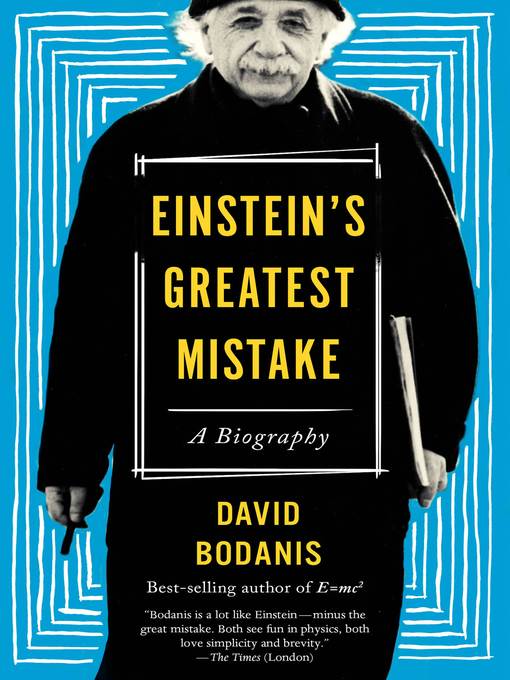
Einstein's Greatest Mistake
A Biography
کتاب های مرتبط
- اطلاعات
- نقد و بررسی
- دیدگاه کاربران
نقد و بررسی

July 25, 2016
Writer and futurist Bodanis (Passionate Minds) imparts fresh insight into the genius—and failures—of the 20th century’s most celebrated scientist. Einstein learned early on to follow his own curiosity rather than his teachers, and Bodanis shows how Einstein’s close friendships with a few young scientists gave him a supportive sounding board for his ideas. Later, Einstein’s dull patent-inspector job gave him time to work out the basics of relativity. Trouble arose when astronomical observations suggested, in opposition to Einstein’s equations, that the universe was unchanging. To make his math agree, Einstein reluctantly added a fudge factor called the cosmological constant, only to regret it when later observations showed the universe really was expanding and his original math had been correct all along. That experience, Bodanis says, made the scientist “downright obdurate” about considering experimental results—exactly the wrong tactic to take as quantum mechanics became the new language of modern physics. Bodanis is sympathetic but realistic: Einstein’s stubbornness effectively ended his career, leaving him isolated and marginalized as the rest of physics moved forward. This provocative biography illuminates the human flaws that operate subtly in the shadows of scientific endeavor. Agent: Patrick Walsh, Conville & Walsh.

A brief biography of "the greatest mind of the modern age" and his revolutionary ideas.The 2005 PBS Nova episode "Einstein's Big Idea" was based on science writer and former Oxford professor Bodanis' bestselling book. Here, the author takes a similar cinematic approach: the narrative is swift, focusing on personalities and simplifying complex ideas, which often works but occasionally converts science to the usual TV magic show. Bodanis passes quickly over his subject's early years, including 1905, when Einstein published four groundbreaking papers. The author emphasizes that if Einstein had never been born, a contemporary would have made those discoveries, but it might have taken generations and several geniuses to duplicate his 1915 paper that converted the simple concepts of special relativity into the fiercely complex unification of mass, energy, space, and gravity that was general relativity. "What Einstein discovered," writes Bodanis, "in the chill of wartime Berlin, was the greatest breakthrough in understanding the physical universe since Newton: an achievement for all time." Einstein's equations predicted an expanding universe. Since the 1915 universe was considered static, he added a "cosmological constant" to correct it, only to discard it when astronomers later discovered it was expanding. Although this was a mistake, Bodanis convincingly argues that it provoked a greater mistake. Einstein created general relativity from his own thoughts. On the single occasion he accepted scientific evidence, it was wrong. When quantum mechanics became accepted after 1920, he dissented. Certain that all matter obeyed precise laws, he rejected increasing evidence that subatomic particle behavior defied common sense. By the 1930s, this rejection placed him outside mainstream physics, where he remained, largely ignored, until his death. Shorter than the best biographies of Einstein (by Walter Isaacson and Dennis Overbye) but still engaging and with more emphasis on the difficulties the scientist faced when physics moved away from the classical view he never abandoned. COPYRIGHT(1) Kirkus Reviews, ALL RIGHTS RESERVED.

May 1, 2016
Noted science writer Bodanis, whose credentials include the "New York Times" best seller "The Secret House" and "E=mc2", basis of a PBS NOVA documentary, offers a pithy look at Albert Einstein. Bodanis frames this work by asking why Einstein ended up rejecting certain aspects of quantum physics and what this "greatest mistake" has meant for his legacy.
Copyright 2016 Library Journal, LLC Used with permission.

























دیدگاه کاربران